GTM Engineer Skills Checklist: Must-Have Competencies
The Skills That Help GTM Engineers Bridge Tech and Revenue for Maximum Impact
Blogby JanJuly 08, 2025

The role of "GTM engineers" has evolved far beyond basic automation and tool connections. Today, companies like OpenAI, Dropbox, and Stripe have dedicated GTM engineers who are building the revenue engines that power massive sales operations.
The job market shows clear trends: AI expertise has become a standard requirement for GTM engineer positions, and technical skills like Python programming appear frequently in job descriptions. Even though the position is relatively new, the field has evolved rapidly from basic automation setup to building sophisticated AI systems that research prospects, write personalized emails, and optimize campaigns automatically.
GTM engineering isn't just about being technical. The GTM engineers making the biggest impact combine code expertise with customer understanding. They're building systems that don't just automate tasks, but actually improve buyer engagement.
Whether you're thinking about becoming a GTM engineer or you're already in the role and want to level up, this checklist covers 15 skills that matter. These aren't just nice-to-haves – they're the competencies that separate entry-level from senior GTM engineer roles.
The Technical Foundation
Not all technical skills are created equal. Some will get you hired, others will get you promoted, and a few will make you irreplaceable.
CRM Platform Mastery (Because Everything Starts Here)
Every GTM engineer needs deep expertise in at least one major CRM. This doesn't mean creating reports or adding custom fields. It means understanding how to architect entire revenue systems.
When sales teams report "our lead routing is broken," effective GTM engineers don't just fix the immediate problem. They redesign the whole lead management system to handle more volume, require zero manual intervention, and provide better visibility into deal progression.
Salesforce skills remain highly valuable in the market. Companies using Salesforce typically have complex sales processes and enterprise-level needs, which means they invest more in skilled professionals who can handle that complexity. HubSpot works well for mid-market companies that need quick implementation and user-friendly interfaces.
For comprehensive CRM optimization strategies, understanding CRM enrichment tools that integrate with automation platforms becomes crucial for building effective systems.
CRM expertise isn't just about knowing the platform. It's about understanding how revenue flows through an organization and building systems that support that flow.
Programming Skills (Yes, You Actually Need Them)
Python has become the default language for GTM engineers, and for good reason. You don't need to be a software engineer, but you need enough Python to manipulate data, connect APIs, and build automation scripts that go beyond what no-code tools can handle.
SQL is essential for career advancement. You need to pull data from databases, analyze it, and turn it into insights that help the business. This skill enables advanced data analysis and reporting capabilities.
JavaScript helps with web development – building Chrome extensions, custom dashboards, or tracking implementations that go beyond standard analytics.
Modern GTM engineers aren't just setting up simple workflows. They're building AI-powered systems that can personalize outreach at scale, score leads based on behavior, and generate content that sounds genuinely human.
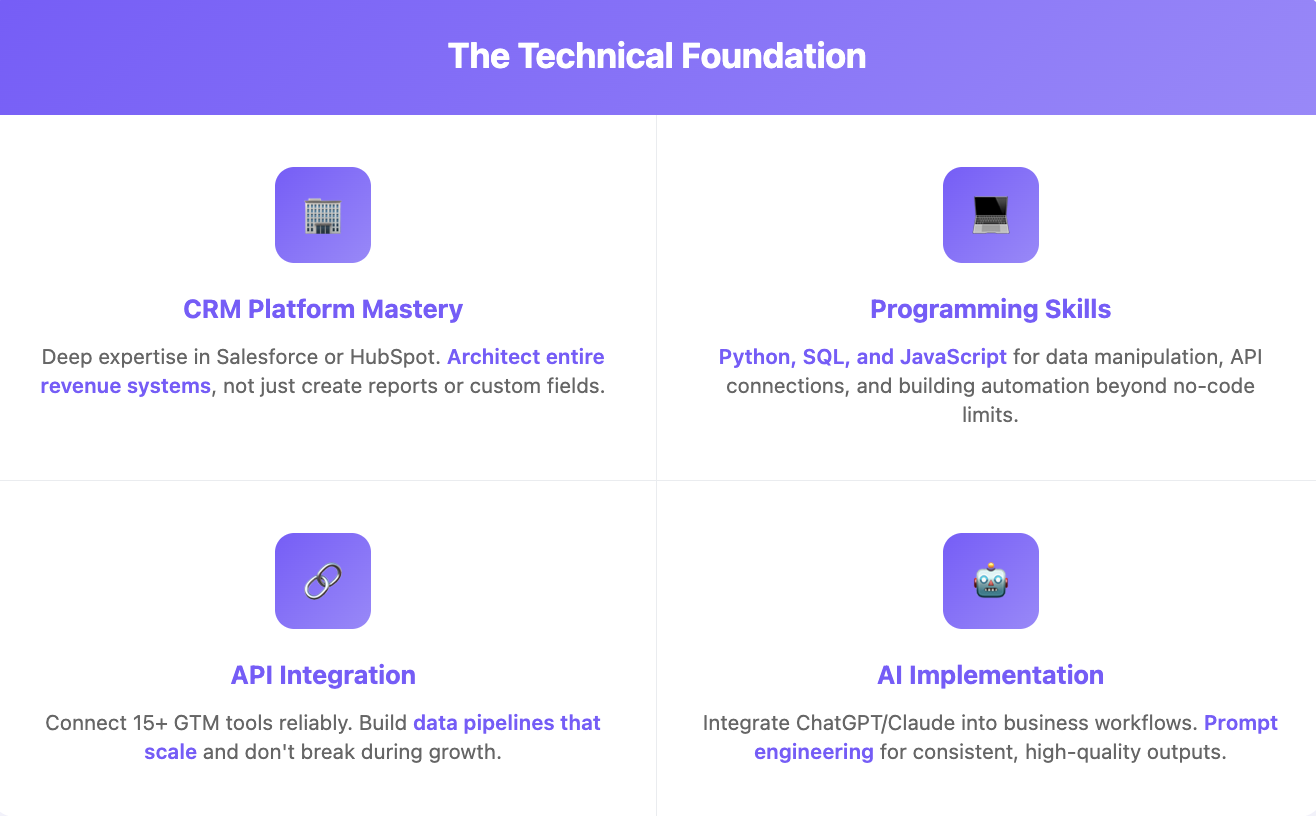
API Integration and Data Pipeline Skills
This is one skill that separates professional GTM engineers from basic automation users. Understanding how to connect platforms through APIs, manage webhooks, and build data pipelines that don't break during scaling becomes crucial.
When companies have 15+ tools in their GTM stack, someone needs to architect how data moves between them reliably. This person commands higher compensation because when these systems break, revenue stops flowing.
You need to know tools like N8N, Zapier and Make for quick wins, but also when to build custom integrations because no-code solutions won't scale or don't meet specific requirements.
AI Skills (The Ones Everyone Wants But Few Have)
AI appears frequently in GTM engineer job postings, but most people don't understand what that means practically. Companies want people who can implement AI solutions that improve GTM performance, not AI theorists.
AI Tool Integration and Prompt Engineering
The ability to integrate tools like ChatGPT or Claude into actual business workflows has become incredibly valuable. This means understanding prompt engineering well enough to get consistent, high-quality outputs that maintain brand voice.
GTM engineers who can build AI workflows that generate personalized email sequences, analyze prospect research, or create dynamic sales materials that convert see significant career advancement opportunities.
The key is understanding how to structure prompts for business use cases. It's not about creative writing – it's about getting AI to analyze a prospect's LinkedIn activity and suggest specific talking points for sales calls.
Data Analysis and Predictive Modeling
You don't need advanced degrees in data science, but you do need to understand statistics well enough to build models that predict business outcomes. This means knowing the difference between correlation and causation, understanding statistical significance, and drawing actionable insights from messy data.
Companies particularly value GTM engineers who can build predictive models for lead scoring, churn prevention, and sales forecasting. These directly impact revenue, which justifies investment in skilled professionals.
Business Skills (The Ones That Actually Get You Promoted)
Technical ability alone won't advance your career. You need to explain how your work impacts revenue to move beyond individual contributor roles.
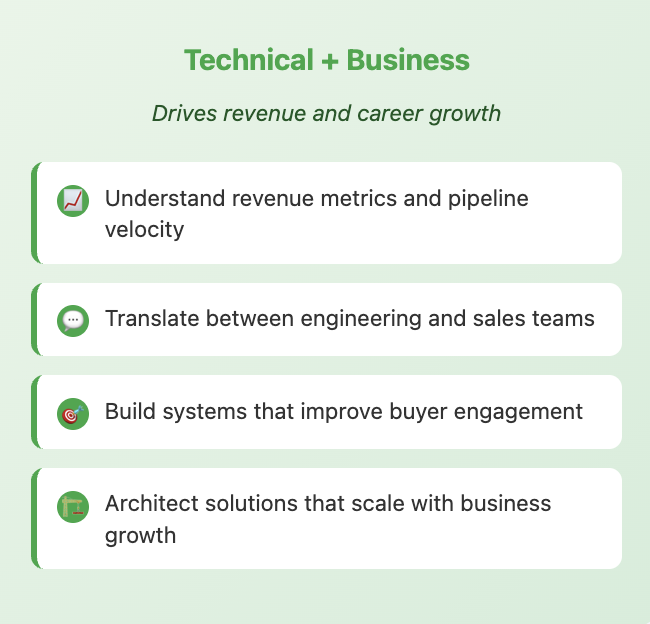
Revenue Operations Understanding
You need deep understanding of sales metrics like conversion rates, cycle length, pipeline velocity, and customer acquisition costs. More importantly, you need to understand how these metrics influence each other and what changes improve them.
Understanding attribution modeling is crucial because it helps you build systems that accurately track which activities generate revenue. This knowledge guides decisions about where to focus technical efforts.
Experience with sales forecasting and quota planning helps you build tools that support strategic decisions, not just operational efficiency.
Cross-Functional Communication
This might be the most important skill on this list. The ability to translate between engineering teams who think in code and sales teams who think in deals makes you incredibly valuable.
Effective GTM engineers facilitate conversations between departments that traditionally don't understand each other. You become the bridge that gets things done.
Project management skills become crucial as you advance. Senior GTM engineers manage complex implementations that touch multiple departments and need to deliver measurable business impact.
Market and Customer Understanding
Industry-specific knowledge can significantly impact compensation. GTM engineers who understand SaaS metrics, compliance requirements in healthcare, or complex B2B sales cycles are more valuable because they can build solutions that fit business context.
Understanding customer behavior and buyer psychology helps you build automation that feels helpful rather than annoying. The best GTM engineers know the difference between scaling human relationships and replacing them.
Platform Expertise That Pays
Certain platform specializations consistently command higher salaries and better job opportunities.
Data Enrichment and Automation Platforms
Databar and Clay expertise has become incredibly valuable. Companies pay premiums for GTM engineers who can maximize Clay's capabilities beyond basic data enrichment.
Deep knowledge of email automation platforms like Instantly or Lemlist, including deliverability optimization and compliance management. This gets technical quickly, and companies invest well in people who can navigate it.
For comprehensive automation strategies, understanding waterfall enrichment tools becomes essential for maximizing data quality and coverage across multiple sources.
Experience with sales engagement platforms like Outreach or SalesLoft at an advanced level. Understanding cadence optimization, A/B testing, and CRM integration workflows.
Data Engineering and Analytics Platforms
Familiarity with data warehousing tools like Snowflake or BigQuery. As companies generate more data, GTM engineers who can manage large-scale data operations become increasingly valuable.
Business intelligence tools like Tableau or Looker, with focus on creating dashboards that drive decisions rather than just displaying information.
Customer data platforms like Segment for unified customer data management. These are becoming essential for companies with complex customer journeys.
The Emerging Skills That Will Matter in 2025
Several new skill sets are starting to command salary premiums as the field evolves.
Security and Compliance Expertise
Understanding GDPR, CCPA, and SOC2 requirements isn't optional anymore – it's becoming essential. As regulations increase, GTM engineers who can build compliant systems while maintaining functionality become highly valuable.
Data governance, access controls, and audit trails for customer data. Enterprise sales often require demonstrating compliance capabilities during the sales process.
Basic cybersecurity knowledge including secure API management and data encryption. As GTM systems handle more sensitive data, security awareness becomes crucial.
Advanced Analytics and Attribution
Multi-touch attribution modeling that goes beyond simple first-touch and last-touch to understand the full customer journey. This helps companies optimize their entire GTM strategy.
Cohort analysis, customer lifetime value modeling, and churn prediction. These skills help you build systems focused on long-term business value.
Understanding experimental design for A/B testing GTM strategies. Companies invest in people who can design and analyze experiments that improve outcomes.
What to Focus on at Each Experience Level
Different career stages should prioritize different skill development for maximum impact.
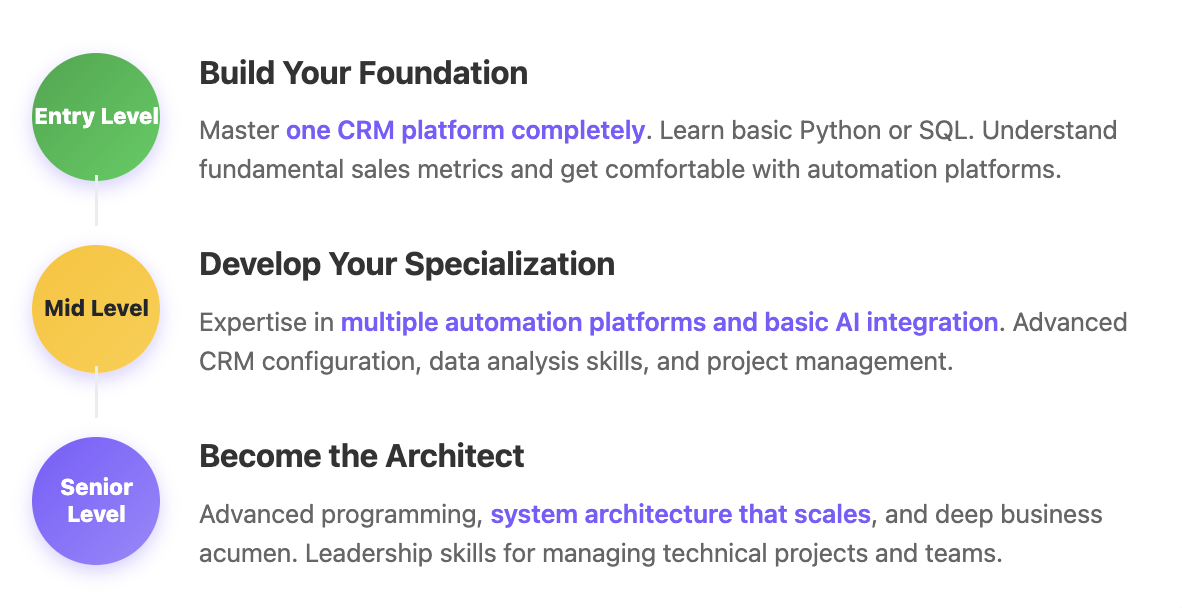
Entry-Level: Build Your Foundation
Master one CRM platform completely. Learn basic Python or SQL. Understand fundamental sales and marketing metrics. Get comfortable with one automation platform and basic data analysis.
Focus on understanding how GTM tools connect and why data quality matters. Build experience with APIs and workflow automation that solves real problems.
Mid-Level: Develop Your Specialization
Expertise in multiple automation platforms, basic AI integration, and project management. Advanced CRM configuration and workflow optimization.
Data analysis skills, statistical concepts, and business intelligence tools. Marketing attribution, lead scoring, and sales forecasting.
Senior-Level: Become the Architect
Advanced programming, system architecture, and solutions that scale with company growth. Deep business acumen and ROI quantification abilities.
Leadership skills for managing technical projects and teams. Strategic business planning and competitive positioning that inform technical decisions.
How to Build These Skills
Developing GTM engineering skills requires combining formal learning with hands-on practice.
Technical Skill Development
Use official training programs from major platforms. Salesforce Trailhead and HubSpot Academy provide both skills and credentials that matter to employers.
Build personal projects that solve real problems. Create automations, lead scoring models, and analytics dashboards that showcase both technical ability and business understanding.
For teams building comprehensive systems, explore our guide to best B2B data enrichment tools that integrate well with automation platforms.
Contribute to open-source projects or build public tools. Many successful GTM engineers have built Chrome extensions or API connectors that solve common problems.
Business Knowledge
Follow practitioners who share real-world experiences. Join GTM engineering communities where people discuss actual challenges and solutions.
Get hands-on experience through internships, freelance work, or side projects. Understanding how these tools work in real business environments provides insights you can't get from tutorials.
Study successful companies' GTM strategies and system architectures. Many share case studies that provide valuable learning opportunities.
Where This Is All Heading
The GTM engineering field keeps evolving, and new skills are becoming valuable as the market matures.
Technical Trends to Watch
AI-powered personalization that dynamically adjusts based on prospect behavior. Understanding large language models and AI workflow design will become more valuable.
Advanced automation spanning multiple touchpoints and integrating with product data. GTM engineers will need to understand customer success metrics and product analytics.
Real-time data processing for immediate response to behavior changes. Event-driven architecture and streaming analytics skills will become important.
Business Evolution
Global market understanding and international compliance as companies expand. GTM engineers will need broader business knowledge.
Product-led growth strategies that blur lines between product features and GTM tactics. Understanding user onboarding and expansion revenue will become crucial.
Emerging GTM channels and evolving buyer preferences that require different technical approaches.
Understanding how to build effective cold email tech stacks becomes essential as GTM engineers need to architect comprehensive automation systems.
For teams exploring different scales of operation, our analysis of prospecting tools for small teams provides context on how GTM engineering skills apply across different organizational sizes.
The Bottom Line
The GTM engineer role sits at the intersection of technical capability and business impact. Success requires continuous learning in both areas, with focus on skills that directly drive revenue growth. Whether you're starting your GTM engineering journey or advancing your career, the competencies that combine technical depth with business value will position you for success in this rapidly evolving field.
Frequently Asked Questions
Do I really need to learn programming to be a GTM Engineer?
Basic programming significantly improves your prospects and earning potential. Python and SQL are most valuable. You can start with no-code tools, but for career advancement, you'll need some coding ability.
How important is AI expertise for GTM Engineers in 2025?
Very important – it appears frequently in job postings. But this means practical implementation, not theoretical knowledge. Focus on integrating AI tools for personalization and automation rather than understanding underlying algorithms.
What business skills matter most for GTM Engineers?
Understanding revenue metrics, cross-functional communication, and translating technical work into business impact. Companies pay premiums for GTM engineers who understand how their work drives pipeline growth.
Should I specialize in specific platforms or stay broad?
Hybrid approach works best: deep expertise in 1-2 core platforms plus working knowledge of adjacent tools. Specialization commands higher salaries, but breadth helps with integration work.
What's the best way to learn these skills without experience?
Start with official certification programs, build personal projects using real GTM tools, and join communities where practitioners share experiences. Hands-on practice beats theoretical knowledge every time.
Related articles
Best Tools for Tracking Year-Over-Year Headcount Growth
How Tracking Employee Growth Can Indentify New Sales Opportunities
by Jan, February 13, 2026
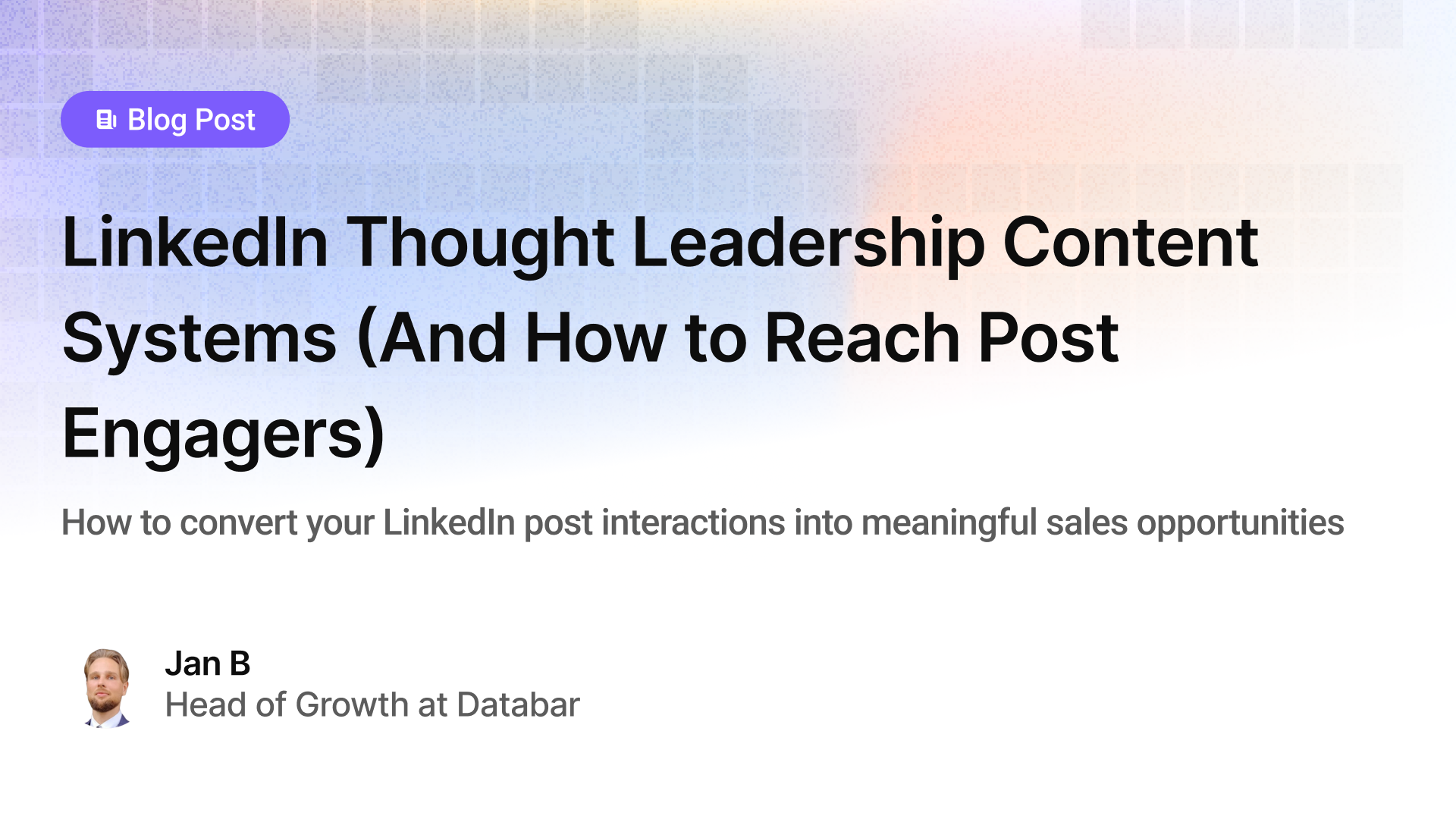
LinkedIn Thought Leadership Content Systems (And How to Reach Post Engagers)
How to convert your LinkedIn post interactions into meaningful sales opportunities
by Jan, February 13, 2026
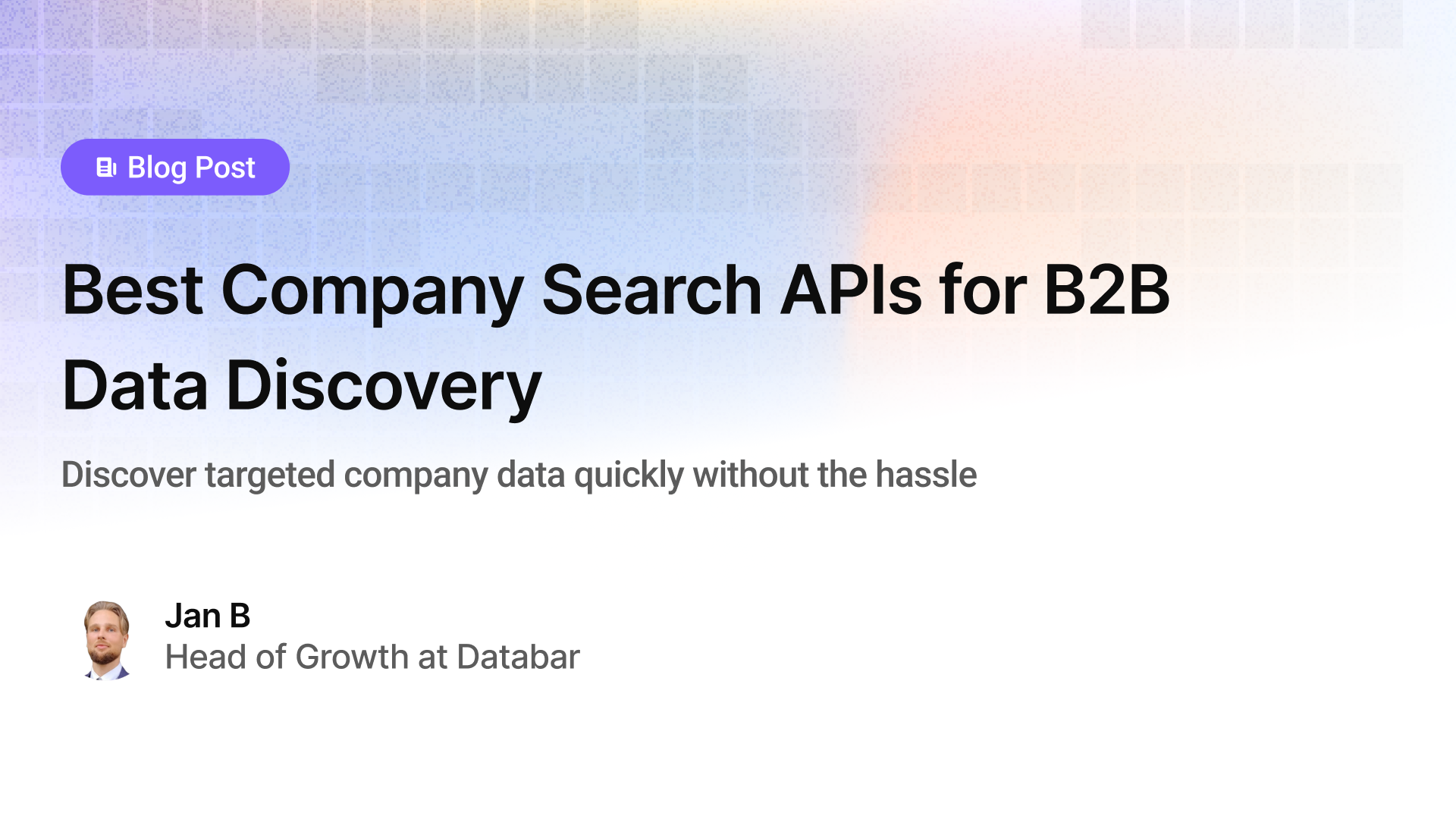
Best Company Search APIs for B2B Data Discovery
Discover targeted company data quickly without the hassle.
by Jan, February 13, 2026
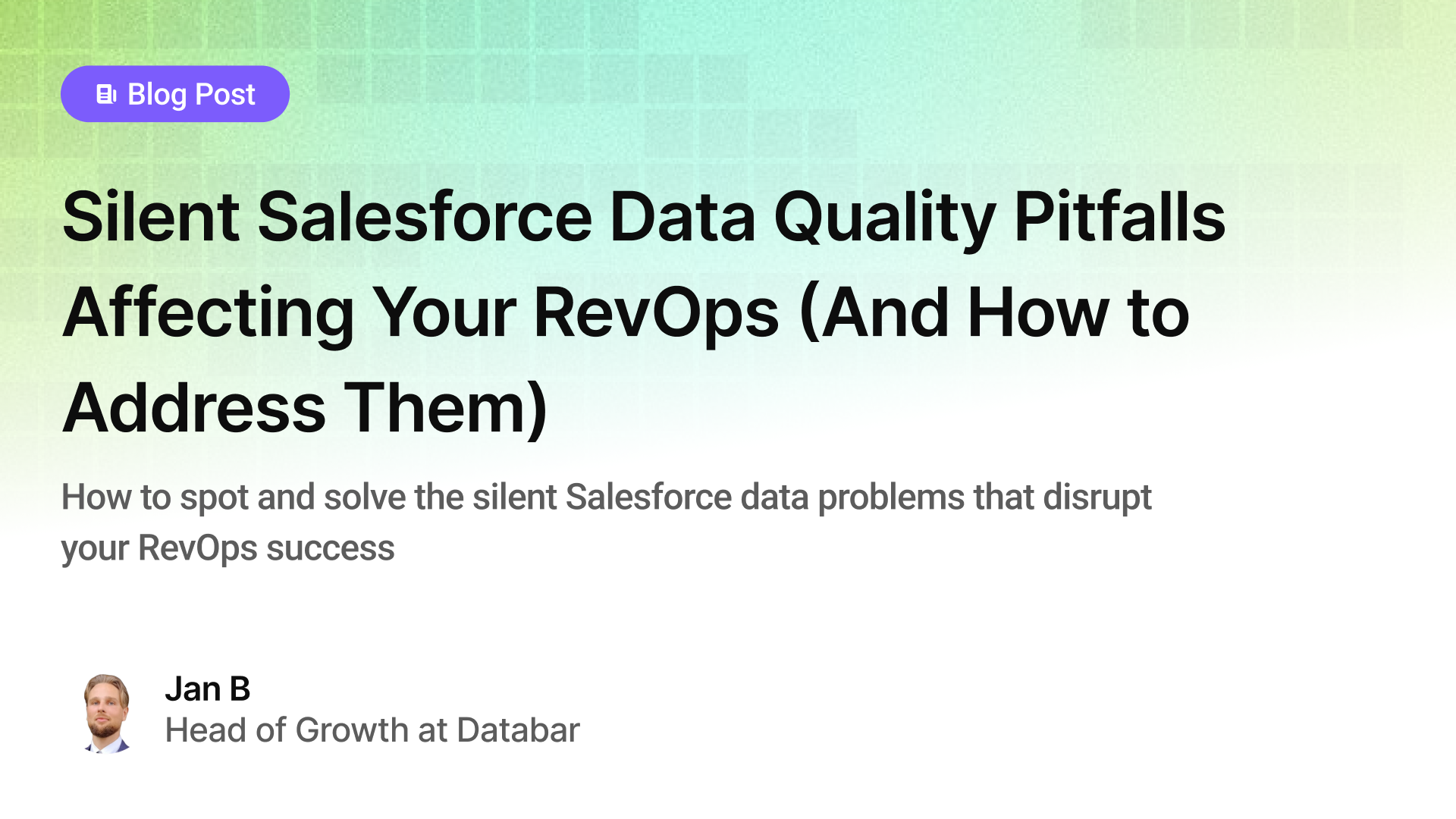
Silent Salesforce Data Quality Pitfalls Affecting Your RevOps (And How to Address Them)
How to spot and solve the silent Salesforce data problems that disrupt your RevOps success
by Jan, February 12, 2026

